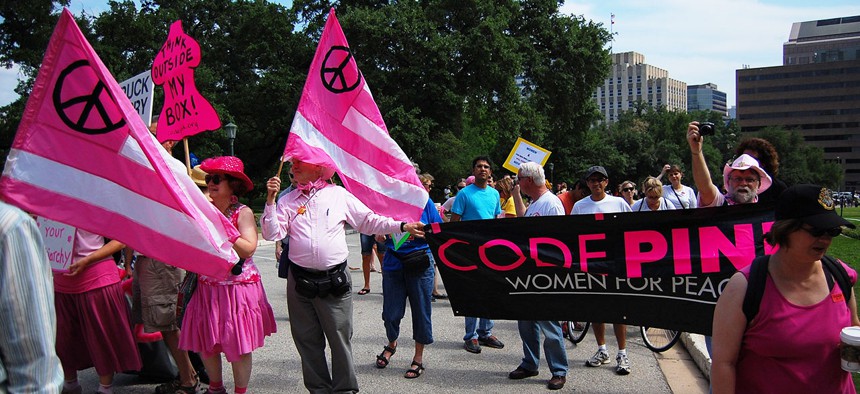
Code Pink members rally in Austin in 20120. Flickr user Alexandra Richmond
A UN Group Says the U.S. Is ‘Allowing Its Women to Lag Behind’
America still has a long way to go in advancing women’s rights.
The US still has a long way to go in advancing women’s rights—at least that’s what a group of United Nations human-rights experts concluded after visiting the country in December.
The group, which spent 10 days in America during a pivotal period in the country’s presidential election cycle, examined women’s safety, reproductive rights, economic and social lives, public and political lives, and access to health care to assess discrimination against women in the country. The visit painted an “overall picture of women’s missing rights” in the US, the group said in a statement released by the UN, which noted that laws and practices vary drastically by state.
“The US, which is a leading State in formulating international human rights standards, is allowing its women to lag behind international human rights standards,” the group said. “US women do not take their rightful place as citizens of the world’s leading economy, which has one of the highest rates of per capita income.”
Particularly jarring for the visiting delegation of five independent human-rights experts were the obstacles women faced in accessing reproductive health-care services. “We witnessed the intimidation and harassment in our visits to clinics,” the experts said at the end of their visit—just a week after a gunman attacked a Planned Parenthood clinic in Colorado, killing three people.
In the US, abortion in the first trimester of a pregnancy, while legal, is a frequent topic of controversy and debate. State-level anti-abortion laws also make it difficult for some clinics to operate and for women to undergo procedures.
American women also face barriers in running for political office (the US is 72 in a global ranking of women’s representation in legislature); have no nation-wide right to paid maternity leave; are frequent victims of violence; and are over-incarcerated in poor conditions, often for non-violent crimes, the UN paper said.
Women who are poor, older, disabled, migrant, LBTQ, or belong to Native American, Afro-American and Hispanic ethnic minority groups are particularly at risk.
The report said the nation’s polarizing political system is at fault for the gap in women’s rights. “We understand the complexity of federalism, but this cannot be regarded as a justification for failure to secure these rights, which are universal, indivisible and inalienable.”
The working group is scheduled to present its complete findings and recommendations to the UN Human Rights Council in June 2016.
(Image via Flickr user Alexandra Richmond)
NEXT STORY: The Ideology Behind the Putin-Trump Bromance






